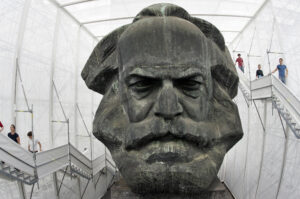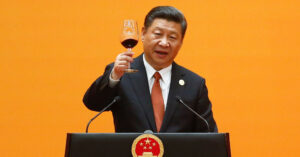Ever since he eliminated China’s two-term limit in 2018, Xi Jinping’s rule has produced a proliferation of articles and studies that compare his rule with Mao’s. The comparison is true only at a very superficial level, relating to the cult of personality that surrounds Xi and the increased inclusion of his name in the official documents of the Communist Party of China (CPC). Thus, in its 2021 resolution “on the Major Achievements and Historical Experience of the Party over the Past Century”, Xi is mentioned 25 times, Mao 18 times, Deng Xiaoping six times, and previous presidents Jiang Zemin and Hu Jintao just once.
These similarities may be useful to gauge the internal party power of Xi, but they tell us nothing about his economic policies or ideology. While Mao’s ideology during the Cultural Revolution was directly anti-Confucian, Xi’s is pro-Confucian. While Mao’s great economic turns — “the Great Leap Forward” and the Cultural Revolution — were motivated by ideology and disregarded stability, Xi’s policies are motivated by the opposite desire: to produce a more stable society.
This reflects evolution over the past 40 years. Following Deng’s sharp pro-market turn that placed economic growth centre stage, first after Mao’s death in 1976, and then even more decisively after the Tiananmen crackdown, China grew tremendously (at an average annual rate of more than 6% per capita between 1992 and 2012), while inequality increased (measured by the Gini index, from 36 to 47 points over the same period). The new China made many people rich, reduced poverty, changed the structure of the elite by having it much more private-sector oriented, and made the country “moderately prosperous”.
This trend was overseen by Jiang Zemin, the General Secretary of the Party from 1989 to 2002, and then by Hu Jintao, who held the two highest offices (head of the Party and head of the state) during the following 10 years. The embourgeoisement of the Chinese elite had to be given an ideological veneer — and Jiang Zemin provided this in 2000, when he introduced the policy of the “Three Represents” which allowed rich entrepreneurs to be more easily accepted in the nation’s governing bodies. Thus, somewhat paradoxically, the Chinese People’s Congress became the richest legislative body in the world, exceeding even the US Congress in the number of dollar millionaires in its ranks.
Both in personnel and ideology, then, a party whose claim to legitimacy was largely rooted in equalising chances and outcomes for most Chinese was gradually becoming the party of the rich. Based on micro data from household surveys, one paper I worked on with Li Yang and Filip Novokmet found that the top 5% of Chinese society had dramatically changed: in 1988, less than one quarter of the elite was linked with the private sector; by 2013, the year after Xi’s ascent to power, that share was close to 60%. We also found an increasing split between the social composition of the party overall and the party’s own elite: while the Party in 2013 still had a majority membership of the “old” (state-related) social groups, the top 5% was increasingly dominated by the “new” social groups (private-sector entrepreneurs and professionals).
The rich not only became more important, but were more visible too. Conspicuous consumption and disregard of public modesty — recall the story of the black Ferrari crashed in Beijing by a son of one of Hu Jintao’s top allies in 2012 — added to the perception of the Party as condoning many of the worst displays of nouveau-riche arrogance. And it seemed very possible, whether for better or worse, that the CPC might continue to evolve into an outwardly pro-rich party, defending the interests of a monied oligarchy, stimulating capitalist development, and holding power similar to the ruling South Korean party during the period of General Park’s rule. The term “communist” in the name of the Chinese party should not make us think such an evolution is impossible: North Korea’s communist party runs a monarchy.
But Xi seemed to have had a different view on the matter. At around the time he assumed his highest powers in 2012, there were two possibilities for the CPC: become a pro-capitalist party both in deed and ideology, or repress the most glaring displays of capitalist power within the party and outside and send the message that the ultimate arbiter is the State and the Party, not the new moguls and oligarchs. In addition, it could discourage ostentatious displays of wealth, punish the most corrupt, and shift the gears of the state towards ensuring less inequality, especially by reducing the urban-rural gap and the division between Eastern and Western provinces.
If we look at Xi’s “Common Prosperity” programme in a realistic way, and not fantasise that it represents some vague return to Maoism, it makes perfect sense: it is the overdue readjustment of excessively pro-capitalist policies, which, while perhaps good for growth, threatened to produce social anomie. And, in taming the liberalisation of his predecessors, what Xi proposes to do is not so different from what social democratic parties of Western Europe realised after the Second World War. Letting capitalism run amok, they thought, would produce another Great Depression, and such developments would only provide grist to the mill of the increasingly powerful Communist parties and trade unions linked with them. By contrast, their social-democratic policies were remarkably successful, so much so that a version of the period’s French sobriquet of the Trentes Glorieuses is applied across much of Western Europe. Inequality went down, growth picked up, and a “normal” middle class composed of hard-working and well-educated workers and employees was created.
We do not know if Xi’s policies will be equally successful. Western European countries were democracies; China is not. West European policies did not depend on one man, or a narrow consensus; they were the product of a much wider intellectual movement that dated back to the pre-war period. Xi’s policies could therefore fall prey to the desire of his eventual successor to differentiate themselves from him — especially if they, similarly to Jiang Zemin, put greater emphasis on economic growth and do not shy away from supporting capitalists. Outside of government, China’s citizens may be, as some parts of the middle class seem already, tired of the repetitive insistence on an ideology that seems an awkward mélange of Marx and Confucius.
Yet while China’s future may not be as firmly seated as Xi wishes it to be, the main ideas behind his “turn to the Left” can be easily articulated: expand the role of the state and the Party, reduce the power of capitalists, and keep growth going while making sure it does not become socially destabilising. We do not need recourse to some fanciful Maoism to explain it. Rather, to borrow the metaphor of Chen Yun, one of the early Chinese Communist leaders, it is time to slightly narrow the cage within which the private sector operates. After all, if such a “readjustment” is successful, it will set China on a track for reasonable growth (of 4-5% per year) over the medium term. This will maintain some inequality, particularly when it comes to geography, and China’s capitalists will still get rich — but they will not be in political control.
Recent reports of China’s economic decline are thus much exaggerated. They reflect the unconscious absorption by Western and Chinese analysts of a Dengist emphasis on growth alone: uniquely in the case of China, growth rates below 7-8% per annum are seen as precursors of economic demise. Yet while Deng’s approach made sense in a post-Mao China traumatised by voluntarist economic policies, it cannot be, nor should it be, maintained forever. As in every country, economic growth and social stability have to be balanced. China will not grow at 10% per annum; nor will it cease to grow. It will not rule the world, nor become irrelevant. Instead, it will maintain an intermediate position — an outcome that should be welcomed by both China and the West.
Disclaimer
Some of the posts we share are controversial and we do not necessarily agree with them in the whole extend. Sometimes we agree with the content or part of it but we do not agree with the narration or language. Nevertheless we find them somehow interesting, valuable and/or informative or we share them, because we strongly believe in freedom of speech, free press and journalism. We strongly encourage you to have a critical approach to all the content, do your own research and analysis to build your own opinion.
We would be glad to have your feedback.
Source: UnHerd Read the original article here: https://unherd.com/



